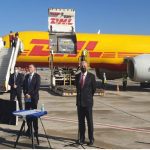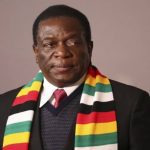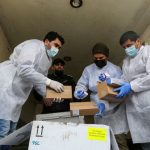Anthony Fauci, the United States’ top infectious disease specialist has received his COVID-19 vaccine along with other senior officials and six health workers at a live-streamed event at the National Institutes of Health (NIH).
The widely-respected scientist said he took the shot “as a symbol to the rest of the country that I feel extreme confidence in the safety and the efficacy of this vaccine.
“I want to encourage everyone who has the opportunity to get vaccinated so that we could have a veil of protection over this country, that would end this pandemic,” he added.
He then gave a thumbs-up sign and clapped for his colleagues as he left the stage of an auditorium at the NIH’s headquarters in Bethesda, a Washington suburb.
The 79-year-old, who continues to practice as a physician, was among the first Americans to receive injections developed by Moderna and the National Institute of Allergies and Infectious Diseases (NIAID), which he has directed since 1984.
NIH director Francis Collins and health secretary Alex Azar also received their vaccinations at the ceremony.
“I want the American people to know that I have absolute and complete confidence in the integrity and the independence of the processes used by the FDA (Food and Drug Administration) to approve these vaccines,” said Azar, a political appointee of the Trump administration.
Before them, six health workers received their shots, many appearing emotional as they were asked to explain why they chose to be vaccinated.
“I work directly with a colon patient so I felt I have an opportunity, why not,” said nurse Naomi Richardson.
It comes as a new poll showed Americans’ willingness to take a coronavirus vaccine has jumped since the first two were authorized.
The USA TODAY/Suffolk University Poll, carried out Wednesday through Sunday, showed 46 percent said they were willing to take the vaccine as soon as they can — a significant jump on the 26 percent who answered similarly in late October.
A further 32 percent said they would wait for others to get the shots before they do so themselves.
Anthony Fauci, the United States’ top infectious disease specialist has received his COVID-19 vaccine along with other senior officials and six health workers at a live-streamed event at the National Institutes of Health (NIH).
The widely-respected scientist said he took the shot “as a symbol to the rest of the country that I feel extreme confidence in the safety and the efficacy of this vaccine.
“I want to encourage everyone who has the opportunity to get vaccinated so that we could have a veil of protection over this country, that would end this pandemic,” he added.
He then gave a thumbs-up sign and clapped for his colleagues as he left the stage of an auditorium at the NIH’s headquarters in Bethesda, a Washington suburb.
The 79-year-old, who continues to practice as a physician, was among the first Americans to receive injections developed by Moderna and the National Institute of Allergies and Infectious Diseases (NIAID), which he has directed since 1984.
NIH director Francis Collins and health secretary Alex Azar also received their vaccinations at the ceremony.
“I want the American people to know that I have absolute and complete confidence in the integrity and the independence of the processes used by the FDA (Food and Drug Administration) to approve these vaccines,” said Azar, a political appointee of the Trump administration.
Before them, six health workers received their shots, many appearing emotional as they were asked to explain why they chose to be vaccinated.
“I work directly with a colon patient so I felt I have an opportunity, why not,” said nurse Naomi Richardson.
It comes as a new poll showed Americans’ willingness to take a coronavirus vaccine has jumped since the first two were authorized.
The USA TODAY/Suffolk University Poll, carried out Wednesday through Sunday, showed 46 percent said they were willing to take the vaccine as soon as they can — a significant jump on the 26 percent who answered similarly in late October.
A further 32 percent said they would wait for others to get the shots before they do so themselves.
Anthony Fauci, the United States’ top infectious disease specialist has received his COVID-19 vaccine along with other senior officials and six health workers at a live-streamed event at the National Institutes of Health (NIH).
The widely-respected scientist said he took the shot “as a symbol to the rest of the country that I feel extreme confidence in the safety and the efficacy of this vaccine.
“I want to encourage everyone who has the opportunity to get vaccinated so that we could have a veil of protection over this country, that would end this pandemic,” he added.
He then gave a thumbs-up sign and clapped for his colleagues as he left the stage of an auditorium at the NIH’s headquarters in Bethesda, a Washington suburb.
The 79-year-old, who continues to practice as a physician, was among the first Americans to receive injections developed by Moderna and the National Institute of Allergies and Infectious Diseases (NIAID), which he has directed since 1984.
NIH director Francis Collins and health secretary Alex Azar also received their vaccinations at the ceremony.
“I want the American people to know that I have absolute and complete confidence in the integrity and the independence of the processes used by the FDA (Food and Drug Administration) to approve these vaccines,” said Azar, a political appointee of the Trump administration.
Before them, six health workers received their shots, many appearing emotional as they were asked to explain why they chose to be vaccinated.
“I work directly with a colon patient so I felt I have an opportunity, why not,” said nurse Naomi Richardson.
It comes as a new poll showed Americans’ willingness to take a coronavirus vaccine has jumped since the first two were authorized.
The USA TODAY/Suffolk University Poll, carried out Wednesday through Sunday, showed 46 percent said they were willing to take the vaccine as soon as they can — a significant jump on the 26 percent who answered similarly in late October.
A further 32 percent said they would wait for others to get the shots before they do so themselves.
Anthony Fauci, the United States’ top infectious disease specialist has received his COVID-19 vaccine along with other senior officials and six health workers at a live-streamed event at the National Institutes of Health (NIH).
The widely-respected scientist said he took the shot “as a symbol to the rest of the country that I feel extreme confidence in the safety and the efficacy of this vaccine.
“I want to encourage everyone who has the opportunity to get vaccinated so that we could have a veil of protection over this country, that would end this pandemic,” he added.
He then gave a thumbs-up sign and clapped for his colleagues as he left the stage of an auditorium at the NIH’s headquarters in Bethesda, a Washington suburb.
The 79-year-old, who continues to practice as a physician, was among the first Americans to receive injections developed by Moderna and the National Institute of Allergies and Infectious Diseases (NIAID), which he has directed since 1984.
NIH director Francis Collins and health secretary Alex Azar also received their vaccinations at the ceremony.
“I want the American people to know that I have absolute and complete confidence in the integrity and the independence of the processes used by the FDA (Food and Drug Administration) to approve these vaccines,” said Azar, a political appointee of the Trump administration.
Before them, six health workers received their shots, many appearing emotional as they were asked to explain why they chose to be vaccinated.
“I work directly with a colon patient so I felt I have an opportunity, why not,” said nurse Naomi Richardson.
It comes as a new poll showed Americans’ willingness to take a coronavirus vaccine has jumped since the first two were authorized.
The USA TODAY/Suffolk University Poll, carried out Wednesday through Sunday, showed 46 percent said they were willing to take the vaccine as soon as they can — a significant jump on the 26 percent who answered similarly in late October.
A further 32 percent said they would wait for others to get the shots before they do so themselves.
Anthony Fauci, the United States’ top infectious disease specialist has received his COVID-19 vaccine along with other senior officials and six health workers at a live-streamed event at the National Institutes of Health (NIH).
The widely-respected scientist said he took the shot “as a symbol to the rest of the country that I feel extreme confidence in the safety and the efficacy of this vaccine.
“I want to encourage everyone who has the opportunity to get vaccinated so that we could have a veil of protection over this country, that would end this pandemic,” he added.
He then gave a thumbs-up sign and clapped for his colleagues as he left the stage of an auditorium at the NIH’s headquarters in Bethesda, a Washington suburb.
The 79-year-old, who continues to practice as a physician, was among the first Americans to receive injections developed by Moderna and the National Institute of Allergies and Infectious Diseases (NIAID), which he has directed since 1984.
NIH director Francis Collins and health secretary Alex Azar also received their vaccinations at the ceremony.
“I want the American people to know that I have absolute and complete confidence in the integrity and the independence of the processes used by the FDA (Food and Drug Administration) to approve these vaccines,” said Azar, a political appointee of the Trump administration.
Before them, six health workers received their shots, many appearing emotional as they were asked to explain why they chose to be vaccinated.
“I work directly with a colon patient so I felt I have an opportunity, why not,” said nurse Naomi Richardson.
It comes as a new poll showed Americans’ willingness to take a coronavirus vaccine has jumped since the first two were authorized.
The USA TODAY/Suffolk University Poll, carried out Wednesday through Sunday, showed 46 percent said they were willing to take the vaccine as soon as they can — a significant jump on the 26 percent who answered similarly in late October.
A further 32 percent said they would wait for others to get the shots before they do so themselves.
Anthony Fauci, the United States’ top infectious disease specialist has received his COVID-19 vaccine along with other senior officials and six health workers at a live-streamed event at the National Institutes of Health (NIH).
The widely-respected scientist said he took the shot “as a symbol to the rest of the country that I feel extreme confidence in the safety and the efficacy of this vaccine.
“I want to encourage everyone who has the opportunity to get vaccinated so that we could have a veil of protection over this country, that would end this pandemic,” he added.
He then gave a thumbs-up sign and clapped for his colleagues as he left the stage of an auditorium at the NIH’s headquarters in Bethesda, a Washington suburb.
The 79-year-old, who continues to practice as a physician, was among the first Americans to receive injections developed by Moderna and the National Institute of Allergies and Infectious Diseases (NIAID), which he has directed since 1984.
NIH director Francis Collins and health secretary Alex Azar also received their vaccinations at the ceremony.
“I want the American people to know that I have absolute and complete confidence in the integrity and the independence of the processes used by the FDA (Food and Drug Administration) to approve these vaccines,” said Azar, a political appointee of the Trump administration.
Before them, six health workers received their shots, many appearing emotional as they were asked to explain why they chose to be vaccinated.
“I work directly with a colon patient so I felt I have an opportunity, why not,” said nurse Naomi Richardson.
It comes as a new poll showed Americans’ willingness to take a coronavirus vaccine has jumped since the first two were authorized.
The USA TODAY/Suffolk University Poll, carried out Wednesday through Sunday, showed 46 percent said they were willing to take the vaccine as soon as they can — a significant jump on the 26 percent who answered similarly in late October.
A further 32 percent said they would wait for others to get the shots before they do so themselves.
Anthony Fauci, the United States’ top infectious disease specialist has received his COVID-19 vaccine along with other senior officials and six health workers at a live-streamed event at the National Institutes of Health (NIH).
The widely-respected scientist said he took the shot “as a symbol to the rest of the country that I feel extreme confidence in the safety and the efficacy of this vaccine.
“I want to encourage everyone who has the opportunity to get vaccinated so that we could have a veil of protection over this country, that would end this pandemic,” he added.
He then gave a thumbs-up sign and clapped for his colleagues as he left the stage of an auditorium at the NIH’s headquarters in Bethesda, a Washington suburb.
The 79-year-old, who continues to practice as a physician, was among the first Americans to receive injections developed by Moderna and the National Institute of Allergies and Infectious Diseases (NIAID), which he has directed since 1984.
NIH director Francis Collins and health secretary Alex Azar also received their vaccinations at the ceremony.
“I want the American people to know that I have absolute and complete confidence in the integrity and the independence of the processes used by the FDA (Food and Drug Administration) to approve these vaccines,” said Azar, a political appointee of the Trump administration.
Before them, six health workers received their shots, many appearing emotional as they were asked to explain why they chose to be vaccinated.
“I work directly with a colon patient so I felt I have an opportunity, why not,” said nurse Naomi Richardson.
It comes as a new poll showed Americans’ willingness to take a coronavirus vaccine has jumped since the first two were authorized.
The USA TODAY/Suffolk University Poll, carried out Wednesday through Sunday, showed 46 percent said they were willing to take the vaccine as soon as they can — a significant jump on the 26 percent who answered similarly in late October.
A further 32 percent said they would wait for others to get the shots before they do so themselves.
Anthony Fauci, the United States’ top infectious disease specialist has received his COVID-19 vaccine along with other senior officials and six health workers at a live-streamed event at the National Institutes of Health (NIH).
The widely-respected scientist said he took the shot “as a symbol to the rest of the country that I feel extreme confidence in the safety and the efficacy of this vaccine.
“I want to encourage everyone who has the opportunity to get vaccinated so that we could have a veil of protection over this country, that would end this pandemic,” he added.
He then gave a thumbs-up sign and clapped for his colleagues as he left the stage of an auditorium at the NIH’s headquarters in Bethesda, a Washington suburb.
The 79-year-old, who continues to practice as a physician, was among the first Americans to receive injections developed by Moderna and the National Institute of Allergies and Infectious Diseases (NIAID), which he has directed since 1984.
NIH director Francis Collins and health secretary Alex Azar also received their vaccinations at the ceremony.
“I want the American people to know that I have absolute and complete confidence in the integrity and the independence of the processes used by the FDA (Food and Drug Administration) to approve these vaccines,” said Azar, a political appointee of the Trump administration.
Before them, six health workers received their shots, many appearing emotional as they were asked to explain why they chose to be vaccinated.
“I work directly with a colon patient so I felt I have an opportunity, why not,” said nurse Naomi Richardson.
It comes as a new poll showed Americans’ willingness to take a coronavirus vaccine has jumped since the first two were authorized.
The USA TODAY/Suffolk University Poll, carried out Wednesday through Sunday, showed 46 percent said they were willing to take the vaccine as soon as they can — a significant jump on the 26 percent who answered similarly in late October.
A further 32 percent said they would wait for others to get the shots before they do so themselves.














